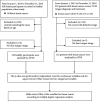A Perspective on Tongue Diagnosis in Patients with Breast Cancer
- PMID: 34987592
- PMCID: PMC8720603
- DOI: 10.1155/2021/4441192
A Perspective on Tongue Diagnosis in Patients with Breast Cancer
Abstract
Introduction: Breast cancer (BC) is the most common cancer in women and patients with BC often undergo complex treatment. In Taiwan, nearly 80% of patients with BC seek traditional Chinese medicine (TCM) during adjuvant chemotherapy to relieve discomfort and side effects. This study investigated tongue features and pattern differentiation through noninvasive TCM tongue diagnosis in patients with BC.
Materials and methods: This cross-sectional, case-controlled, retrospective observational study collected patient data through a chart review. The tongue features were extracted using the automatic tongue diagnosis system (ATDS). Nine tongue features, including tongue shape, tongue color, fur thickness, fur color, saliva, tongue fissures, ecchymoses, teeth marks, and red dots, were analyzed. Results and Discussion. Objective image analysis techniques were used to identify significant differences in the many tongue features between BC patients and non-BC individuals. A significantly larger proportion of patients with BC had a small tongue (p < 0.001), pale tongue (p < 0.001), thick fur (p < 0.001), yellow fur (p < 0.001), wet saliva (p < 0.001), thick tongue fur (p < 0.001), fissures (p=0.040), and ecchymoses in the heart-lung area (p=0.013). According to logistic regression, small tongue shape, pale tongue color, yellow fur color, wet saliva, and the amounts of fissures were associated with a significantly increased odds ratio for BC.
Conclusions: This study showed significant differences in tongue features, such as small tongue shape, pale tongue color, thick fur, yellow fur color, wet saliva, fissure, and ecchymoses in the heart-lung area in patients with BC. These tongue features would imply yin deficiency, deficiencies of blood, stagnation of heat, and phlegm/blood stasis in TCM theory. There is a need to investigate effective and safe treatment to enhance the role of TCM in integrated medical care for patients with BC.
Copyright © 2021 Po-Chi Hsu et al.
Conflict of interest statement
The authors declare that they have no conflicts of interest.
Figures



References
-
- Early Breast Cancer Trialists’ Collaborative Group. Comparisons between different polychemotherapy regimens for early breast cancer: meta-analyses of long-term outcome among 100,000 women in 123 randomised trials. The Lancet . 2012;379(9814):432–444. doi: 10.1016/S0140-6736(11)61625-5. - DOI - PMC - PubMed
LinkOut - more resources
Full Text Sources

